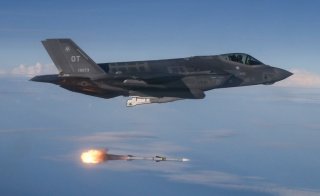Crazy Fact: A Single F-35 Can 'Slaughter' a Small Air Force
In a recent war game, the F-35, as a defense observer put it, “slaughtered the competition,” killing twenty aggressors for each F-35 downed.
Here's What You Need to Remember: The long-term data from Red Flag is an unambiguous endorsement of the F-35: not only has the fifth-generation fighter consistently distinguished itself as a potent combat platform, but its ability to act as a “force multiplier” for nearby friendly units makes it an invaluable battlefield tool.
Lockheed Martin’s F-35 Lightning II stealth jet fighter is no stranger to recurrent, if not always convincing, media skepticism.
The F-35’s detractors have long questioned its capabilities and reliability, but the fifth-generation fighter’s stellar performance record in a series of recent high-profile exercises should put many of those fears to rest.
First held in 1975, Red Flag is the premier air combat exercise of the U.S. Air Force (USAF). Over the span of three weeks, around 100 aircraft are tested in a variety of air-to-air, air-to-ground, space, reconnaissance, and electronic warfare scenarios. It was at the Red Flag 2017 exercises that the F-35 platform faced one of its earliest and most grueling trials. A subpar showing at Red Flag would have been received by the F-35 program’s critics as a sign of vindication, suggesting that they were right all along to question the fighter’s capabilities.
But the result was an altogether different one: The F-35, as a defense observer put it, “slaughtered the competition,” killing twenty aggressors for each F-35 downed.
The F-35 achieved this remarkable kill ratio in a realistic battlefield setting that included notional enemy air defenses, multiple air threats, and electronic countermeasures (ECM). Impressive as it was, the F-35’s combat performance doesn’t tell the whole story. The exercises also served as a live demonstration of the F-35’s sensor fusion feature—that is, its ability to generate a live picture of the battlefield that can be fed to nearby friendly units.
“Before, where we would have one advanced threat and we would put everything we had—F-16s, F-15s, F-18s, missiles, we would shoot everything we had at that one threat just to take it out—now we are seeing three or four of those threats at a time,” Lt. Col. George Watkins, 34th Fighter Squadron commander, told Aviation Week. “Just between [the F-35] and the [F-22] Raptor, we are able to geolocate them, precision-target them, and then we are able to bring the fourth-generation assets in behind us after those threats are neutralized,” Watkins explained. “It’s a whole different world out there for us now.”
Nor can the F-35’s success be dismissed as a one-off, as the fighter showcased similarly strong performance at Red Flag exercises in 2019. Referring to the exercises, Air Force Chief of Staff Gen. Dave Goldfein noted that the F-35 was “exceeding our expectations when it comes to not only being able to survive, but to prosecute targets.” According to data from the drills, the F-35 averaged seven surface-to-air missile system and five air asset kills per mission. The Italian pilots who participated in the Red Flag exercises were overflowing with praise: “The results we have achieved in these two weeks are almost unbelievable: the statistics do not need comments,” said Maj. Alessandro P.
More recently, F-35 squadrons occupied a prominent battlefield role during Red Flag drills in early 2020. “The F-35 also has an extremely high level of battlefield awareness and can pass that information to other F-35s anywhere in the fight without any pilot interaction,” explained 421st Fighter Squadron Lt. Col. Richard Orzechowski. “In terms of the amount of information, think fiber-optic versus dial-up internet. That’s a huge advantage.”
The long-term data from Red Flag is an unambiguous endorsement of the F-35: not only has the fifth-generation fighter consistently distinguished itself as a potent combat platform, but its ability to act as a “force multiplier” for nearby friendly units makes it an invaluable battlefield tool.
Mark Episkopos is a national security reporter for The National Interest. This article is being republished due to reader interest.
Image: Flickr.

